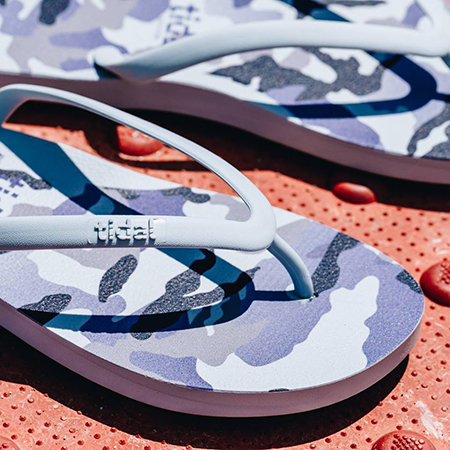RESULTS:
- Ongoing Continuous Improvement/Cost Reduction Strategies
- Sustainability in Products and Processes
- $25,000 Increased investment in new products
- $2,000 investment in plant/equipment
- $5,000 investment in information systems/software
- $35,000 investment in workforce practices/employee skills
- Save $60,000 on investments
WHO:
Tidal New York (also known as Homegrown for Good LLC), whose name is a reference to reviving American manufacturing was founded by brothers, Tommy and Tim Gibb in 2014. Both with a history in the footwear manufacturing industry, they wanted to start a business that defied many of the fast fashion factories of their past. Tidal New York’s flip flops are 100% made in America, sourcing materials from family-owned companies around the U.S. The company takes great pride in not only their clean, transparent operations, but their commitment to hiring veterans. The company has a strong reputation for creating the most comfortable flip-flops ever, they even offer all their customers a money back guarantee, no questions asked.
WHAT:
With an emphasis on being stewards to the environment, Tidal New York wanted to refine their manufacturing processes as well as improve on all areas of “waste”. MTEC engineer, Phil vanOss, worked with their team to identify inefficiencies they could not see as clearly themselves. Value Stream Mapping and different manufacturing process improvements were ideal to implement for a leaner work flow.
HOW:
Tidal New York is applying a Kanban approach, which matches inventory to demand by using a trigger from UPS. Through better communication and visual management, their team will be able to standardize cues to reduce waste and maximize value. Ultimately this will bring their rate of 150 flip flops per day closer to 400 plus. UPS also now handles putting in their greeting cards, eliminating the first extra step in their process.
Updating plant layout and eliminating curing time are also important steps that Tidal’s team is implementing to create a more efficient flow. Depending on their staffing levels, the same team member was generally doing strap production and washing. By investing in a continuous flow washing machine with conveyors, their team will be able to greatly speed up these two processes to match their rate in soles and printing.
While the team will need more jigs to improve the productivity of their second printing machine, they have begun print to order, reducing inventory with this pull-type system. With a reduction in the variety of colors they are currently printing, Tidal New York’s production will lean out in no time.
